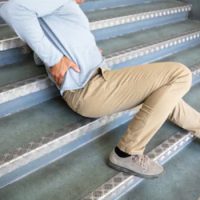Why An Accident Victim’s “Superior” Knowledge Of A Hazard Matters In A Personal Injury Lawsuit

In a slip and fall case the plaintiff needs to do two things to get their case heard by a jury. First, the plaintiff needs to establish that the premises owner had “actual” or “constructive” knowledge of the hazard that caused the plaintiff’s accident in the first place. Second, the plaintiff must defeat any attempt by the defense to show the plaintiff had “equal or superior” knowledge of that same hazard.
Basically, if a customer slips on a puddle of water in the store, they first need to prove the store’s management knew the puddle was there or that they would have found the puddle by exercising due diligence. Then, the plaintiff must refute any counter-argument that they knew there was a puddle on the ground and decided to step over it knowing the risk.
Judge Allows Injured Gas Station Customer to Proceed with Case
A recent decision from a federal judge in Atlanta, Brown-Legette v. Quiktrip Corporation, provides a practical example of these ideas. In this case, the plaintiff went to a local gas station to fill up her car. She parked her car next to a gas pump and went inside the station to purchase the gas. She then returned to the car to pump the gas. During this process, she walked around her car at least twice. But at one point, she slipped and fell.
The plaintiff sued the gas station owner (the defendant), alleging the fall was caused by a hazard on the ground near her car. In response, the defendant argued that the plaintiff must have had “equal or superior” knowledge of any hazard, as she walked around her car twice before falling. The defense moved for summary judgment, arguing there was no way a jury could find otherwise.
The judge disagreed and denied the motion. While it is true that under Georgia law a person who “successfully navigates dangerous conditions” is “presumed to have knowledge of that condition,” here the evidence was unclear. The available evidence, taken largely from the defendant’s security cameras, showed the plaintiff “had previously walked in close proximity to the area where she fell.” But the footage did not establish that she had “walked over the exact same location where she fell.” And the plaintiff herself denied seeing any hazard prior to her fall. As such, the judge believed the plaintiff had presented sufficient facts to submit her personal injury case to a jury.
Contact a Decatur, Georgia, Personal Injury Attorney Today
A slip and fall accident takes place in less than a second. But the long-term impact can last for months or years. So if your accident was the result of negligence on the part of a commercial property owner, you have a right to seek compensation for your injuries. An experienced Atlanta slip and fall lawyer can review your case and advise you on how best to proceed. Contact Shiver Hamilton Campbell today to schedule a free consultation with a member of our personal injury team.
Source:
storage.courtlistener.com/recap/gov.uscourts.gand.280030/gov.uscourts.gand.280030.40.0.pdf


